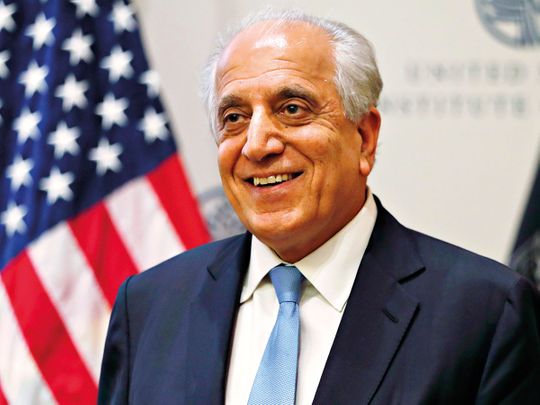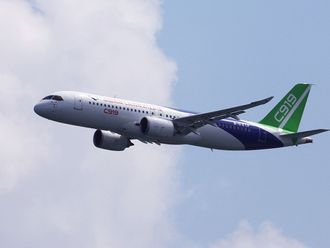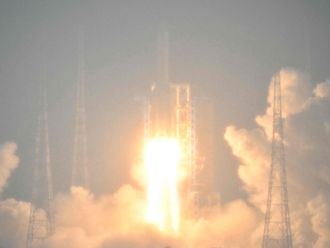
Washington, D.C.: Afghanistan’s leaders are angered on many levels by the Trump administration’s peace negotiations with the Taliban. But they have concentrated their fury on a single figure: Zalmay Khalilzad.
They accuse Khalilzad, an Afghan-born US diplomat who is leading the talks, of cutting them out of planning for their future. They say he has kept them in the dark about the details of the negotiations, and they suggest his ultimate goal is to sideline the Afghan government so he can achieve a long-cherished ambition to be the country’s leader himself.
“The reason he is delegitimizing the Afghan government and weakening it, and at the same time elevating the Taliban, can only have one approach,” Hamdullah Mohib, Afghanistan’s national security adviser, told reporters this week in Washington. “It’s definitely not for peace.”
Trump administration officials reject those charges, noting that Khalilzad called the Afghan president, Ashraf Ghani, to brief him after the most recent negotiations with the Taliban in Doha, Qatar. They insist he harbours no political ambitions in Afghanistan, where he grew up and returned as ambassador from 2003 to 2005.
But Khalilzad — a swaggering, self-confident diplomat who prides himself on his independence and ability to make deals — is a tempting target for unhappy Afghans. He served as ambassador in Baghdad and at the United Nations, in addition to Kabul, the Afghan capital, and he has an especially long history in Afghanistan’s murky politics. His name has surfaced on a few occasions as a candidate for a top government job.
Mohib’s charges, which he repeated in multiple sessions with reporters and former officials, enraged the administration. He was summoned to the State Department and dressed down by the undersecretary of state for political affairs, David Hale, who told him that “attacks on Ambassador Khalilzad are attacks on the department and serve only to hinder the bilateral relationship and the peace process,” according to a statement.
The personal nature of the attacks stunned longtime diplomats, who pointed out that Khalilzad was merely carrying out the policies of his government. Mohib is a trusted adviser to Ghani, so officials said the vitriol reflected the president’s grievances. Afghanistan’s chief executive, Abdullah Abdullah — a rival of Ghani’s — criticised Mohib, saying government officials “should be cautious while making comments.”
Daniel F. Feldman, who served as special representative for Afghanistan and Pakistan under President Barack Obama, said: “It was a complete misreading of the US political environment — the executive branch, the Hill and the American public. You don’t risk rupturing the overall relationship due to personal pique, especially when the target of his ire was ably executing US policy.”
Some likened the outburst to earlier rifts between Hamid Karzai, the former Afghan president, and Obama’s aides. Others reached for a more distant parallel, comparing the alienation of the Afghan government to South Vietnam, which was cut out of peace talks between the United States and North Vietnam by Henry Kissinger, then the secretary of state, in the early 1970s.
Current and former Trump administration officials said they sympathised with the Afghan government’s frustration. For years, the United States refused to hold reconciliation talks with the Taliban unless the Afghan government had a seat at the table. Under President Donald Trump, however, the patience of the United States with a 17-year-long war has run out, and pressure mounted to open talks with the Taliban, even on their terms.
“There’s a cost to this because it means the Taliban has achieved their goal,” said Laurel E. Miller, who served as acting special representative until early in the Trump administration. “But what’s the alternative, if you want to get the peace process started?”
After the latest talks in Doha, Khalilzad said the United States and the Taliban had a draft agreement on two of four elements necessary for a settlement: assurances that Afghanistan would not become a haven for terrorism and a timeline for a US military withdrawal.
Still to be hashed out are a ceasefire and the composition of a new Afghan government, which would almost certainly include the Taliban. Those negotiations, Khalilzad said, would require the participation of Afghanistan’s current government.
“The conditions for #peace have improved,” he wrote this week on Twitter. “It’s clear all sides want to end the war. Despite ups and downs, we kept things on track and made real strides.”
Critics of Khalilzad said that by cutting out the Afghan government, he reinforced the perception that the negotiation was less about securing the future of a peaceful Afghanistan than clearing the way for a US withdrawal, which Trump has wanted since taking office.
“Khalilzad is a capable diplomat who faces a difficult balancing act,” said Husain Haqqani, a former Pakistani ambassador to Washington, who played host at a dinner for Mohib. “To get the Taliban to talk to him, he feels he must emphasise the prospect of US withdrawal before getting to other subjects.”
Critics point to a column Khalilzad wrote for The Washington Post in 1996, when he was an analyst at the RAND Corp., as evidence that he has long pushed for American engagement with the Taliban.
In the article, however, Khalilzad hedged his bets. The Taliban, he wrote, could “put Afghanistan on a path toward peace or signal continuing war and even its end as a single entity.”
The fixation with Khalilzad, some said, was largely a substitute for the broader anguish of Afghans who are coming to terms with the fact that Americans have washed their hands of the country.
“You can’t find an Afghan political figure who doesn’t have an opinion on Khalilzad because they all know him,” said Miller, who is now the director of the Asia program at the International Crisis Group. “The real issue is not the personality of an American diplomat; the real issue is a policy divergence.”












